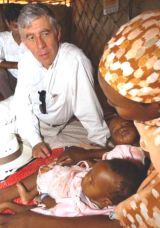British FM urges Sudan’s Beshir to heed calls for action in Darfur
KHARTOUM, Aug 24 (AFP) — British Foreign Secretary Jack Straw on Tuesday urged Sudanese President Omar al-Beshir to heed growing international calls for swift action on the crisis in the war-torn region of Darfur as a United Nations deadline for Khartoum to comply or face sanctions approaches.
 “Our collective interest is to see a safe, secure and prosperous Sudan able to live at peace with itself,” Straw told reporters afer separate meetings with Sudanese President Omar al-Beshir and UN Secretary General Kofi Annan’s representative for Sudan, Jan Pronk.
“Our collective interest is to see a safe, secure and prosperous Sudan able to live at peace with itself,” Straw told reporters afer separate meetings with Sudanese President Omar al-Beshir and UN Secretary General Kofi Annan’s representative for Sudan, Jan Pronk.
Straw said he told the president: “The government of Sudan has to help us to help them. And that means fulfilling the obligations imposed on them by resolution 1556 and voluntarily accepted by them in the action plan which followed discussions with Mr. Pronk.”
The UN Security Council has given the Sudanese government until the end of the month to meet a string of demands aimed at improving the humanitarian situation in the region and stabilising security conditions or face the prospect of international action.
The action plan thrashed out by Pronk and Sudanese Foreign Minister Mustafa Osman Ismail earlier this month was designed to help Sudan undertake a step-by-step implementation of the Security Council resolution on the crisis.
Straw pointed out that much of his discussions with Sudanese officials focused on the plan, often referred to as the August 5 Darfur Plan of Action, “to see what steps they are taking to implement the obligations which they have put on themselves.”
He asserted that the aim was not to find fault with the government and a reason for conflict, but rather to help it.
“No one should be in any doubt about out determination to do all that we can to help this country and its people look forward to a better future,” he said.
Straw met Bashir and Pronk after a brief visit to Northern Darfur and a tour of the Abu Shouk camp for displaced persons.
The visit came only days before UN chief Kofi Annan is to report to the Security Council on the extent of Sudan’s cooperation over the crisis.
Annan’s report will partly rely on Pronk’s assessment of the situation over the past 30 days.
“It is on the basis of his (Pronk’s) report and the secretary general’s report that the Security Council will make judgement on whether or not there has been sufficient progress,” said Straw.
He declined to say, judging from his visit to Darfur, what the contents of the reports might be, but said: “Nobody could visit Sudan without being struck by the scale and complexity of the problems which face this country.”
Straw said: “It is a terrible humanitarain crisis. It is something which is of very great concern to the whole of the international community and we have to deal with it.”
He did, however, concede that there was an improvement in certain areas over the past few weeks.
“What I understand is that there has not been aerial bombardment since the end of June, that the ceasefire is broadly holding, but that atrocities have continued, and that in itself is causing a great deal of fear for many sectors of the population across Darfur.”
Commenting on his encounters with the displaced at the Abu Shouk camp, he said he “got from them a sense of their fear as a result both of what had happened to them and their families and the killings which they witnessed and their concerns about whether or not they will be able to go back”.
It was, he said, the sort of “feeling people have about the way they feel they were driven from their homes. And the fear they have about going back to their homes and trying to resume their livelihoods.
“Within this camp certainly people felt safe. But it’s safety and security outside the camps, which is the vast part of Darfur, which is the absolute imperative,” he stressed.
The UN estimates that between 30,000 and 50,000 people have died as a result of the conflict in Darfur, some 1.2 million others displaced from their homes and a further 180,000 forced to flee into neighboring Chad.
Straw later left Khartoum for Nairobi en route to South Africa.
